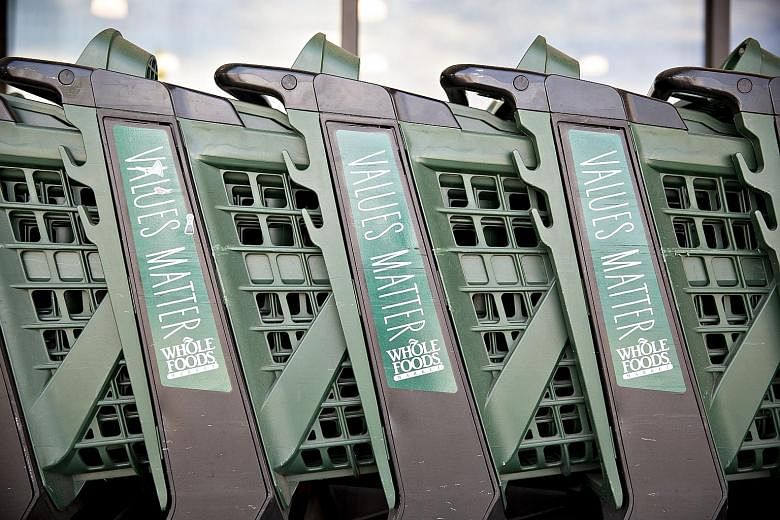NEW YORK • Since its founding 23 years ago, Amazon.com has upended the business of selling books, music and just about everything else we consume - except food. Well, not anymore. In one fell swoop, Amazon founder Jeff Bezos has charged into the supermarket business with the US$13.7 billion (S$19 billion) acquisition of Whole Foods last Friday.
The deal brings to a head a years-long battle brewing between Amazon and traditional retail powerhouses such as Walmart.
Armed with giant warehouses, shopper data, the latest technology and nearly endless funds - and now with Whole Foods' hundreds of physical stores - Amazon is set to reshape a US$800 billion grocery market that is already changing rapidly.
And much of the battle is expected to take place online, on Amazon's home turf. "This shows that online is going to be very dominant in the grocery business - and very quickly," said former Whole Foods executive Errol Schweizer.
News of the deal sent shares of traditional retailers such as Walmart, Target, Costco and Kroger tumbling as much as 13 per cent as investors tried to digest the implications of an Amazon-backed grocery chain.
"This deal should leave no doubt that Amazon is deadly serious about dominating all aspects of retail," said Mr Paul Cuatrecasas, chief executive of Aquaa Partners, a London-based investment banking firm, in an e-mail.
Amazon, which is sitting on US$21.5 billion in cash, has recently begun experimenting with bookstores and a small grocery but this is by far its most ambitious move into physical retail. It was recently granted a patent for technology that would block shoppers from comparing prices using their mobile devices while they are in stores.
In Whole Foods, Amazon is acquiring a company that has recently come under pressure from investors for its lagging performance.
Set up in 1978, Whole Foods, whose stores now span more than 430 locations, has found it difficult to attract more mainstream consumers as Walmart and other large chains have stepped up their sales of natural and organic products.
The merger offers a test of whether Amazon, which has generally built its business on low prices, can successfully integrate into the mainstream a grocer known for premium service and higher prices.
"This partnership presents an opportunity to maximise value for Whole Foods Market's shareholders, while at the same time extending our mission and bringing the highest quality, experience, convenience and innovation to our customers," said Whole Foods chief executive John Mackey.
The deal will put fresh pressure on Walmart, which has been aggressively expanding its online business to win over consumers. It announced last Friday that it had agreed to buy online clothing company Bonobos for US$310 million. The deal comes just months after Walmart's US$3.3 billion purchase of Amazon competitor Jet.com.
It is unclear how Amazon will use Whole Foods, as the company would not go into detail about its plans. Mr Bezos is known for making unconventional decisions and having big ambitions, and this could mean a more frontal assault on Walmart - a face-off between the old and the new dominant forces in the retail world.
Any heated competition among retailers could be a win for consumers, who will be able to pick up their organic sugar beets from Canada, fresh turbot from the North Atlantic and papayas from Guatemala at ever-cheaper prices.
WASHINGTON POST, NYTIMES

